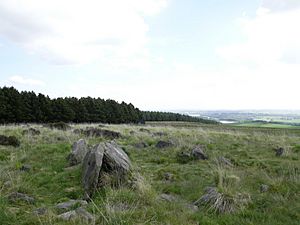Pikestones facts for kids

Pikestones, looking south
|
|
| Location | near Anglezarke and Chorley |
|---|---|
| Region | Lancashire, England |
| Coordinates | 53°38′59.86″N 2°33′56.78″W / 53.6499611°N 2.5657722°W |
| Type | Chambered cairn |
| History | |
| Periods | Neolithic |
| Site notes | |
| Condition | some damage |
Pikestones is what's left of a very old burial mound, called a chambered cairn. It's found on Anglezarke moor in Lancashire, England. This ancient site was built during the Neolithic period, also known as the New Stone Age. It's a special place that tells us about people who lived thousands of years ago.
Contents
What are the Pikestones?
Pikestones was once a huge mound of stones and earth. It was about 45 metres (150 feet) long and 18 metres (60 feet) wide at its widest part. Inside, there was a burial chamber. This chamber was made from large upright stone slabs. Two big flat stones, called lintel slabs, covered the top. The chamber itself was about 4.5 metres (15 feet) long, 0.9 metres (3 feet) wide, and 0.9 metres (3 feet) high.
How the Cairn was Designed
The whole mound was built to face almost exactly North-South. The burial chamber was placed under the wider northern end. At the very northern edge of the mound, there was a double wall. This wall curved inwards, creating an entrance area. This entrance might have been a special forecourt where ceremonies took place.
What You See Today
Over many years, parts of the Pikestones cairn have been damaged. People have taken stones from it, a process called "robbing." Today, the most noticeable parts are five large gritstone slabs. These are the main remains of the original burial chamber. They stand as a reminder of the huge structure that once existed.
Ancient Burial Customs
Archaeologists have found interesting clues about how people used Pikestones for burials. Evidence suggests that bodies were not placed directly into the stone chamber at first. Instead, it seems they were left outside the cairn, perhaps near the entrance. After some time, and likely after special ceremonies, the bones were carefully collected. These bones were then placed inside the stone burial chamber. This practice gives us a glimpse into the unique burial traditions of the Neolithic people.
Why was Pikestones Built Here?
Pikestones is the oldest human-made structure in its area. It's one of only two known chambered tombs found in Lancashire. Building such a large monument would have taken a huge amount of effort. Many people would have worked together to move and place the massive stones.
A Prominent Location
Like most long burial mounds, Pikestones was built in a very noticeable spot. It sits on a ridge, high up at about 276 metres (900 feet). This high location gave the Neolithic builders amazing views of the land around them. It also meant that the Pikestones structure could be seen from far across the Lancashire plain. This might have been a way for the builders to show other groups that this land belonged to them.
 | James Van Der Zee |
 | Alma Thomas |
 | Ellis Wilson |
 | Margaret Taylor-Burroughs |

